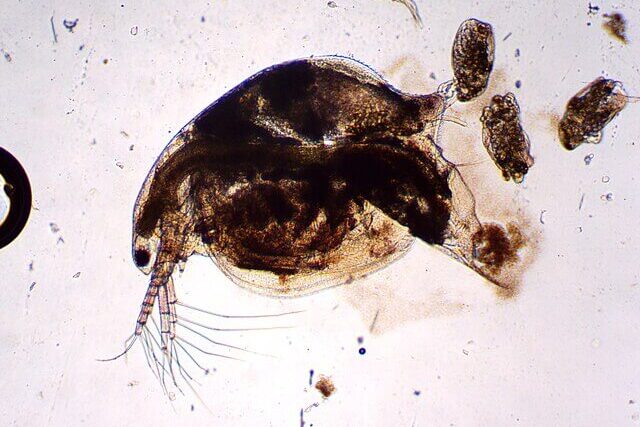
Scientists have discovered a promising solution for filtering drugs, pesticides, and industrial chemicals from wastewater, potentially making it safer for the environment – water fleas.
“We’ve developed our bioequivalent of a Dyson vacuum cleaner for wastewater, which is very, very exciting,” said study co-author Karl Dearn, a professor of mechanical engineering at the University of Birmingham.
Traditional wastewater treatment plants often fail to completely remove persistent chemical pollutants, leading to contamination of rivers, streams, and irrigation systems, which harms ecosystems and contaminates food and water. Existing filtration methods are often costly, environmentally damaging, and impractical. To address this, scientists turned to water fleas: an eco-friendly, cost-effective, and scalable natural filter.
Water fleas, belonging to the Daphnia genus, are tiny crustaceans that filter feed, consuming small particles of detritus, algae, and bacteria in their environment.
“I had my ‘A-ha!’ moment and I thought, ‘Wait a second, they can absorb chemicals’,” said Luisa Orsini, an environment professor at the University of Birmingham and co-author of the study published in the journal Science of the Total Environment.
The researchers selected four types of water fleas capable of ingesting pollutants of concern to public health professionals: the pharmaceutical compound diclofenac, the pesticide atrazine, the heavy metal arsenic, and the industrial chemical PFOS, commonly used in waterproof clothing production.
To identify the most suitable water fleas for addressing these pollutants, scientists revived dormant embryos that had settled at the bottom of rivers. These embryos are encased in protective casings, which sink to the lake or riverbed and can remain dormant for centuries.
The researchers selected embryos from different time periods when the selected pollutants were either prevalent or absent—strains from 1900, 1960, 1980, and 2015. “Either the naive or the very experienced ones were doing a better job at filtering chemicals,” said Orsini.
In the laboratory, they grew the water flea populations through cloning and assessed their genetic makeup and survival capabilities. The fleas’ filtering abilities were then tested in various environments, including an aquarium, 100 litres of water, and, most recently, in a real treatment facility with over 2,000 litres of water. The next phase will involve scaling up to 21 million litres.
In laboratory conditions, the water fleas successfully filtered 90% of diclofenac, 60% of arsenic, 59% of atrazine, and 50% of PFOS.
“Removing 50% of PFOS is excellent compared to whatever exists now because nothing removes or metabolises PFOS like this,” said Orsini. “And [other approaches are] extremely costly, producing a lot of toxic byproducts.”
They are self-sustaining, reproducing by cloning and adjusting their population size based on nutrient availability.
Joseph R. Shaw, an environmental toxicologist from Indiana University, noted the adaptability of these crustaceans to various environments, making it feasible to implement this system in diverse conditions and meet different needs. Since the solution is cost-effective and carbon-neutral, it can be utilised in advanced water treatment facilities and in developing countries with limited infrastructure.
The discovery of this natural, eco-friendly filtration method provides hope for mitigating the impact of pollutants on water ecosystems, which is essential for protecting both the environment and human health.
“This system is poised to be a gamechanger,” said Shaw. Adding technologies such as gene editing could even lead to developing “super-Daphnia” to target specific chemicals of interest and to improve the efficiency of collection.
“I’m a big fan of Daphnia. The sky’s the limit,” he said.
——————————————————————————
At Natural World Fund, we are passionate about stopping the decline in our wildlife.
The decline in our wildlife is shocking and frightening. Without much more support, many of the animals we know and love will continue in their decline towards extinction.
When you help to restore a patch of degraded land through rewilding to forests, meadows, or wetlands, you have a massive impact on the biodiversity at a local level. You give animals a home and food that they otherwise would not have had, and it has a positive snowball effect on the food chain.
We are convinced that this is much better for the UK than growing lots of fast-growing coniferous trees, solely to remove carbon, that don’t actually help our animals to thrive.
This is why we stand for restoring nature in the UK through responsible rewilding. For us, it is the right thing to do. Let’s do what’s right for nature!
Donate today at https://naturalworldfund.com/ and join in the solution!

